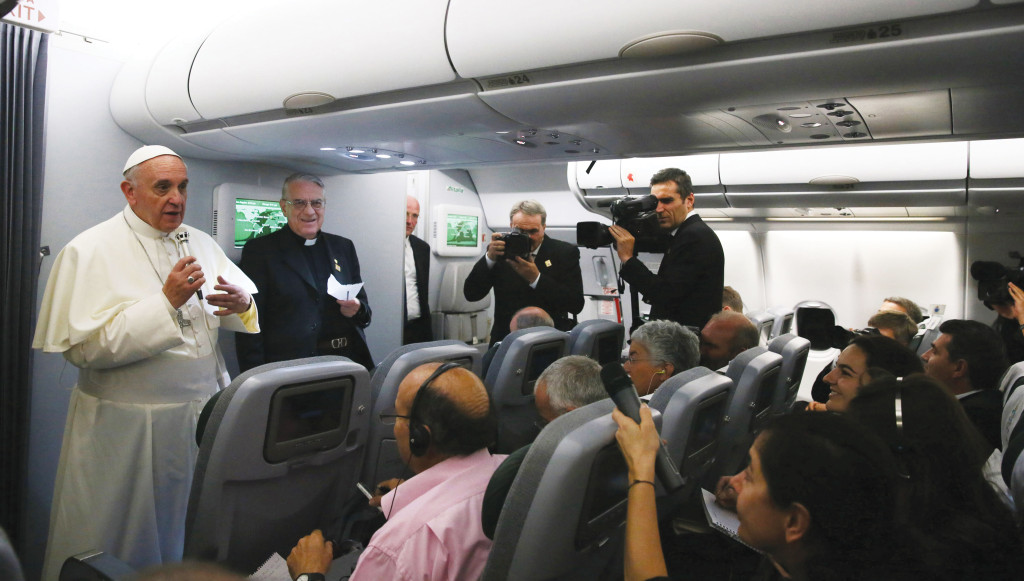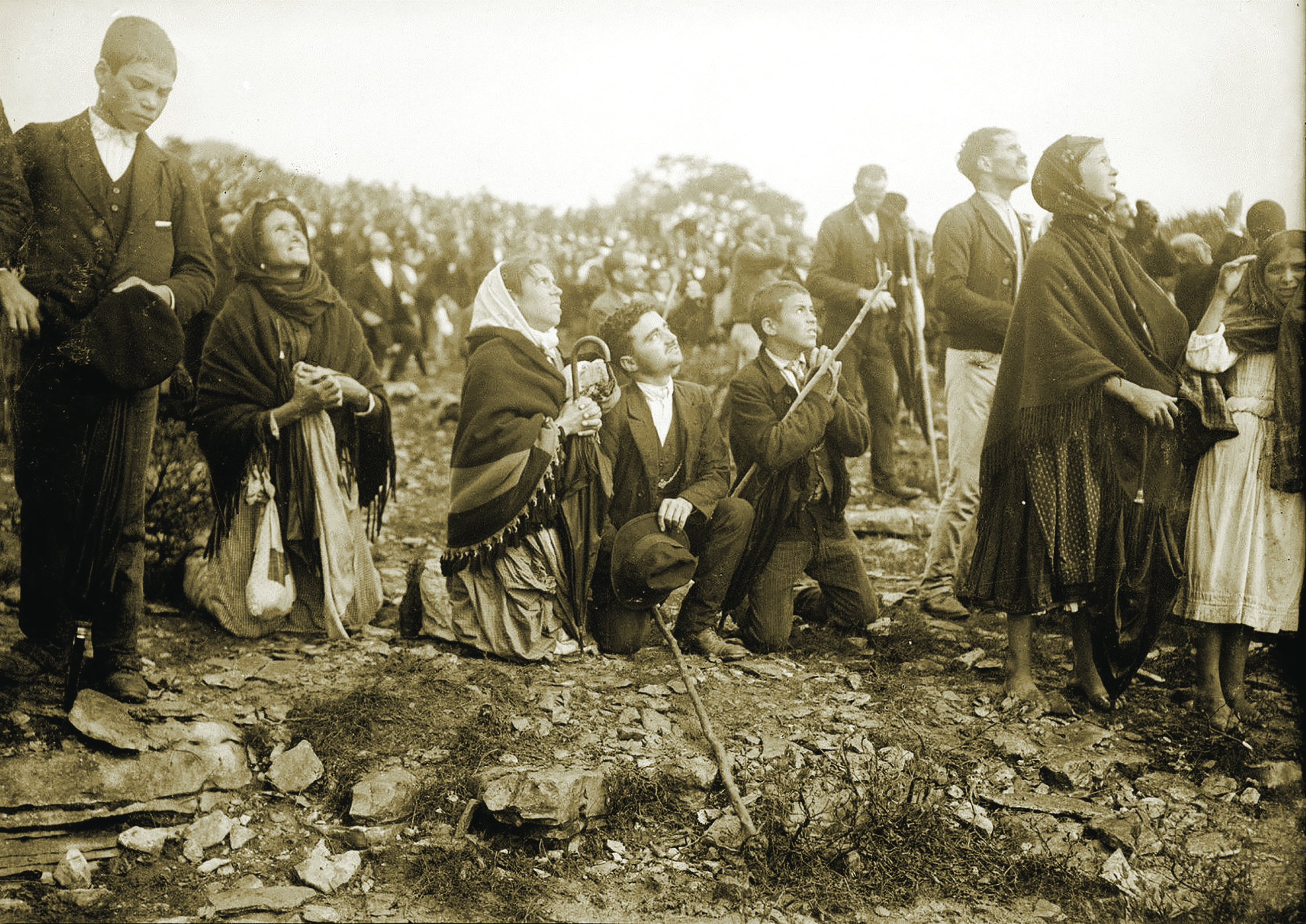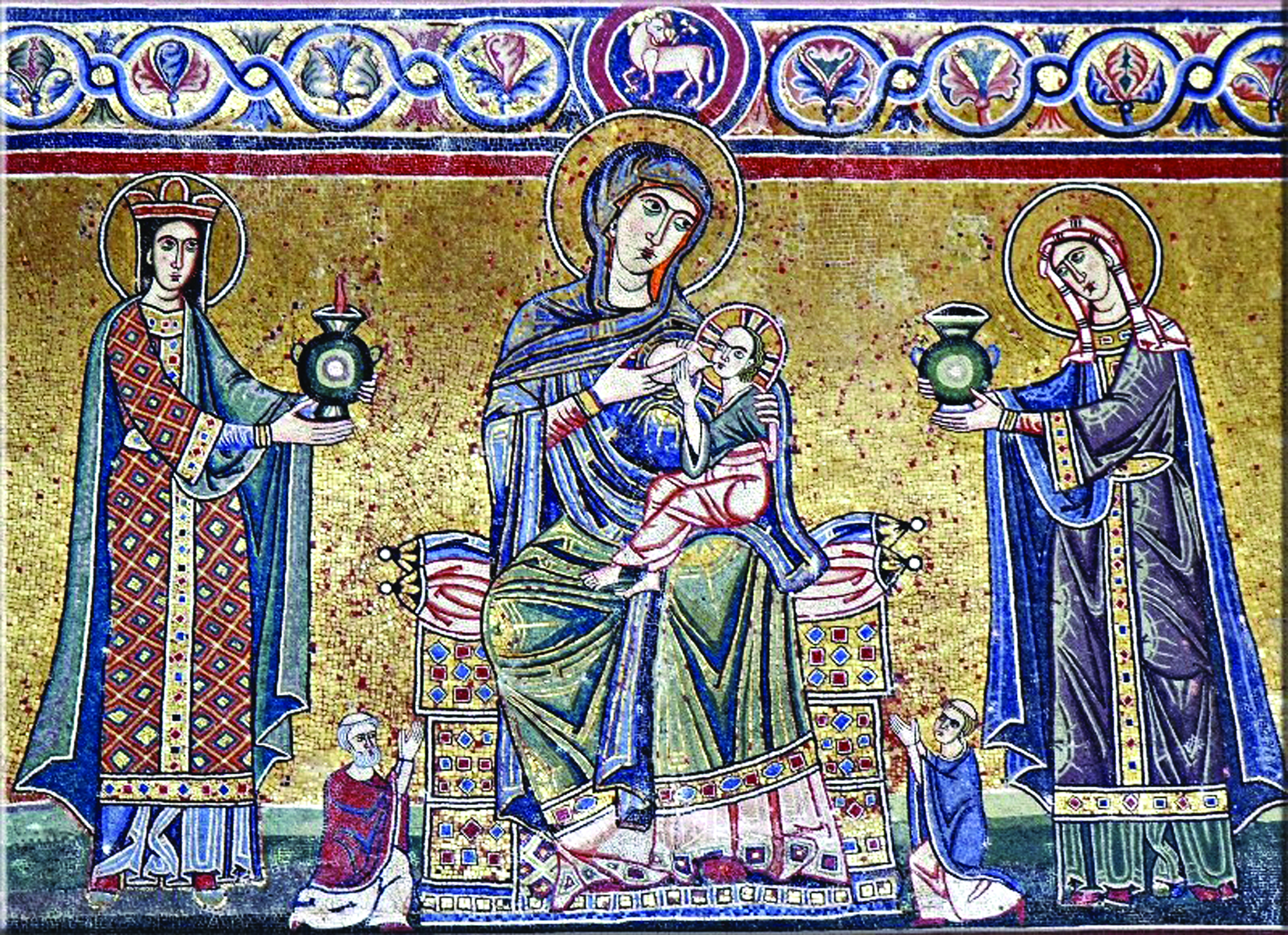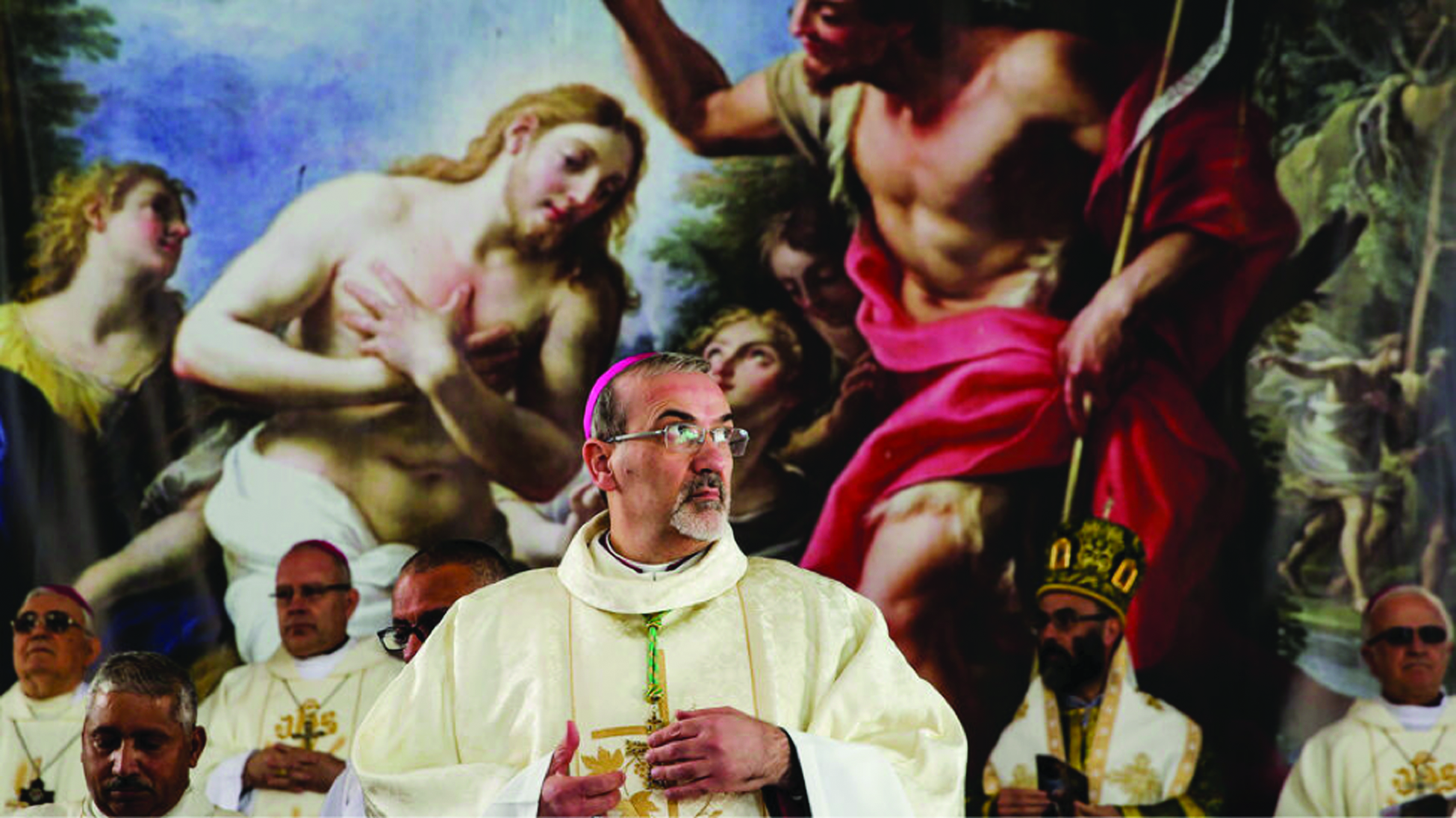Speaking to journalists for about 80 minutes on his July 28 flight back to Rome from World Youth Day in Brazil, Francis was startlingly candid on many issues, but his remarks on homosexuality, priests with homosexual tendencies, and a “gay lobby” in the Vatican raised the most eyebrows.
The Pope’s remarks were quickly reported in hundreds of media outlets and web sites around the world. But many did not place the remarks in their full context. Thus, it seemed useful to offer here the complete text of the question and answer which were most controversial (the last of 21 questions asked by journalists in this extraordinary press conference). The text was emailed out on behalf of the Vatican Press Office by Father Tom Rosica of the Salt and Light Television Network of Toronto, Canada. (At the Moynihan Letters, on the internet, I have given a complete commentary on the entire press conference, which some may find useful to consult: www.moynihanletters.com.)

Pope Francis on his plane
Before giving the text of the question and answer, however, it is important to note that the entire thrust of the Pope’s approach to the journalists was within the context of what had occurred in Brazil: a week of crowded, emotional meetings with millions of young people in which the Pope had intentionally emphasized the positive, the goodness and mercy of God, rather than the Church’s lofty and often challenging moral teaching, especially in sexual matters. This was not to suggest that the teaching could be altered in any way, as he himself stated during the interview with the journalists. The young people already knew what the Church’s teaching was, the Pope said. So he decided to invite them to encounter the reality, the goodness, the love and mercy, of Christ. He was imitating the father in the Parable of the Prodigal Son: when the son turned from his wretched existence in Babylon and came home, the father did not say, “Son, what did you do with all the money?” but, “My son, thank God you came home; let us celebrate.” And he ordered a feast to be held.
A second point has been little noted: that the chief thrust of the Pope’s words is to point to a distinction between a personal act of immorality and the creation of a “lobby” (a better word would probably be “faction” or even “mutually supportive group of conspirators”; in Italy, the Italians have taken to using the English word “lobby” to refer to “faction”; but, when the Italian phrase “gay lobby” is translated back into English, the word “lobby” is kept, though the meaning of the word in Italy has been changed from what it means in English). This is a subtle but important point, especially because the Pope refers to other lobbies besides the so-called “gay lobby” operating in the Vatican, including lobbies based on money and on membership in Freemasonry. In other words, the Pope is focusing attention, not on personal sexual sins, but on the sins of exploiting or manipulating or attempting to control and change the Church and her teaching. “This is the most serious problem for me,” the Pope says. And these are his last words in the press conference. Thus to focus on sexual teaching of any sort — which the Pope in any case says remains what the Church has always taught — is actually an effective way to avoid the Pope’s chief point: there are factions in the Church working against the Church.
Another “takeaway” from the Pope’s remarks: Francis continues to support Monsignor Battista Ricca as his choice (the appointment was announced on June 15) to be the prelate of the Vatican’s “bank” (the Institute for Religious Works, or IOR). Since then, a series of articles by Italian Vaticanist Sandro Magister, who writes for Italy’s secular L’Espresso magazine, has alleged that Ricca’s file was “sanitized” by Vatican superiors friendly to him, and that damaging reports on Ricca’s behavior 12 and 13 years ago in Uruguay, when Ricca served in the Vatican nunciature in Montevideo, were removed. Magister has presented the content of some of these (allegedly) removed reports, and has suggested that Francis would now decide to remove Ricca in light of this new information. But the Pope, answering a direct question about the matter, said he has examined Ricca’s file and still supports Ricca.
Also, Pope Francis said in the interview that the date for the canonization of Blessed Pope John Paul II has not been set. He said there are concerns that Polish pilgrims may find Polish roads in December (December 8 is one date proposed) “too icy” to travel on safely. Another date being considered is November 27, 2013, a bit earlier than a December date; a third is the Feast of Divine Mercy in the spring of 2014. Here is the email circulated by Father Rosica:
RIO DE JANEIRO
Dear Friends and Colleagues,
In response to many messages and calls earlier today regarding Pope Francis’ meeting with journalists aboard the return flight to Rome from Rio de Janeiro last night, I have received the full working transcript of his remarks from Fr. Lombardi. Since most of your questions relate to his response to the question about Monsignor Ricca and the gay lobby, I have done a working translation of the question and the full answer of the Pope…
The powerful and deeply moving visit of Pope Francis to Brazil last week left a deep and lasting impression upon this country as well as on the continent and the entire world. We encountered in the Bishop of Rome a shepherd “who knows the odor of his sheep,” a bearer of hope and peace, and an extraordinary pastoral model of tenderness and mercy.
He stressed the necessity of mercy throughout his visit, and reached out to so many people on the peripheries of society…
His comments on the plane, particularly about the divorced and remarried, women, and homosexuals must be read and understood through the lenses of the Gospel of Jesus Christ, the outreach and concern of the Church for those on the fringes, and the mercy, tenderness and forgiveness of a pastor who walks among his people.
Question to Pope Francis from Ilse, a journalist on the flight
Ilse: I would like to ask permission to pose a rather delicate question. Another image that went around the world is that of Monsignor Ricca and the news about his personal life. I would like to know, Your Holiness, what will be done about this question. How should one deal with this question and how does Your Holiness wish to deal with the whole question of the gay lobby?
Pope Francis’ response: Regarding the matter of Monsignor Ricca, I did what Canon Law required and did the required investigation. And from the investigation, we did not find anything corresponding to the accusations against him. We found none of that. That is the answer.
But I would like to add one more thing to this: I see that so many times in the Church, apart from this case and also in this case, one looks for the “sins of youth,” for example; is it not thus? And then these things are published. These things are not crimes. The crimes are something else: child abuse is a crime.
But sins, if a person, or secular priest or a nun, has committed a sin and then that person experienced conversion, the Lord forgives and when the Lord forgives, the Lord forgets, and this is very important for our lives.
When we go to confession and we truly say “I have sinned in this matter,” the Lord forgets, and we do not have the right to not forget because we run the risk that the Lord will not forget our sins, eh? This is a danger. This is what is important: a theology of sin.
So many times I think of St. Peter: he committed one of the worst sins denying Christ. And with this sin they made him Pope. We must think about that fact often.
But returning to your question more concretely: in this case [Ricca] I did the required investigation and we found nothing. That is the first question.
Then you spoke of the gay lobby. Agh… so much is written about the gay lobby. I have yet to find on a Vatican identity card the word gay. They say there are some gay people here. I think that when we encounter a gay person, we must make the distinction between the fact of a person being gay and the fact of a lobby, because lobbies are not good. They are bad. If a person is gay and seeks the Lord and has good will, who am I to judge that person? The Catechism of the Catholic Church explains this point beautifully but says, wait a moment, how does it say, it says, these persons must never be marginalized and “they must be integrated into society.”
The problem is not that one has this tendency; no, we must be brothers, this is the first matter. There is another problem, another one: the problem is to form a lobby of those who have this tendency, a lobby of the greedy people, a lobby of politicians, a lobby of Masons, so many lobbies. This is the most serious problem for me. And thank you so much for doing this question. Thank you very much!
From the Catechism of the Catholic Church
2358 The number of men and women who have deep-seated homosexual tendencies is not negligible. This inclination, which is objectively disordered, constitutes for most of them a trial. They must be accepted with respect, compassion, and sensitivity. Every sign of unjust discrimination in their regard should be avoided. These persons are called to fulfill God’s will in their lives and, if they are Christians, to unite to the sacrifice of the Lord’s Cross the difficulties they may encounter from their condition.
On behalf of Fr. Federico Lombardi and the Holy See Press Office, thank you for your continued interest and collaboration.
—Father Tom Rosica






Facebook Comments